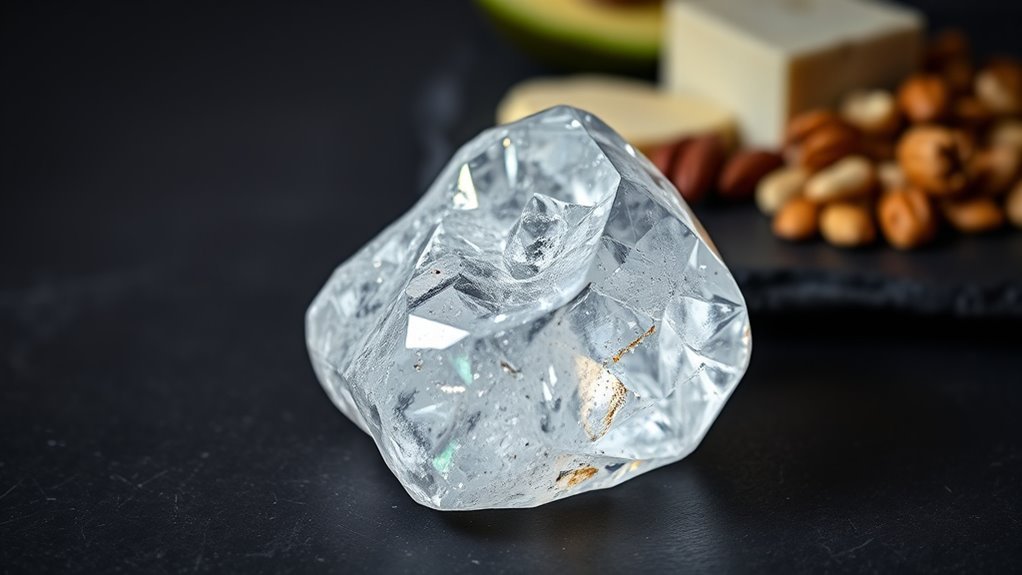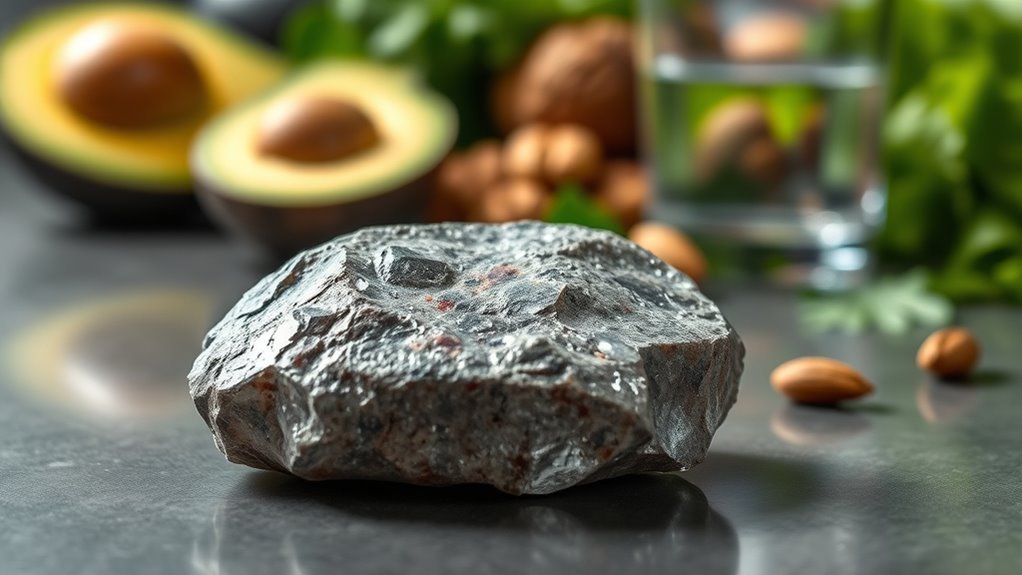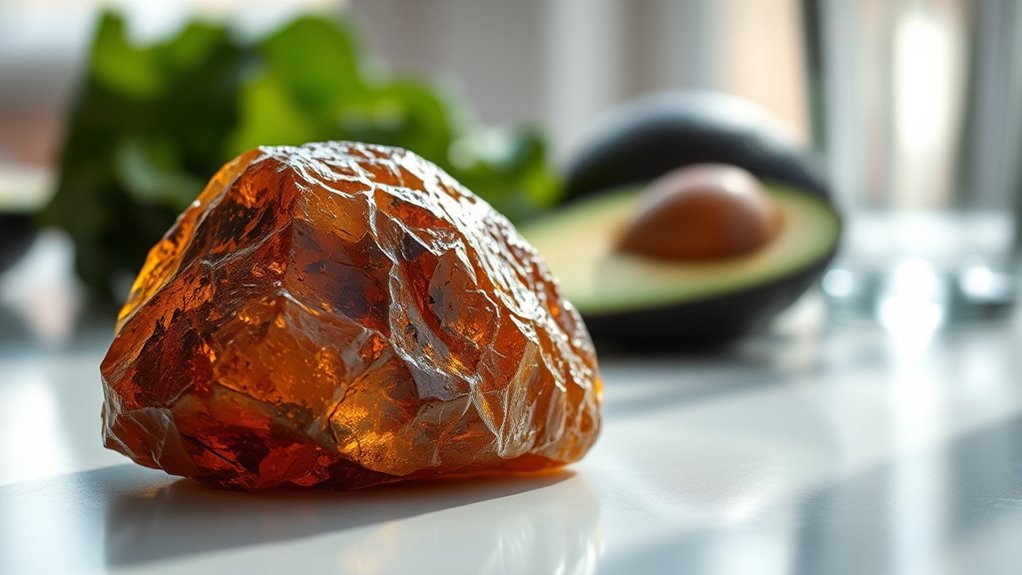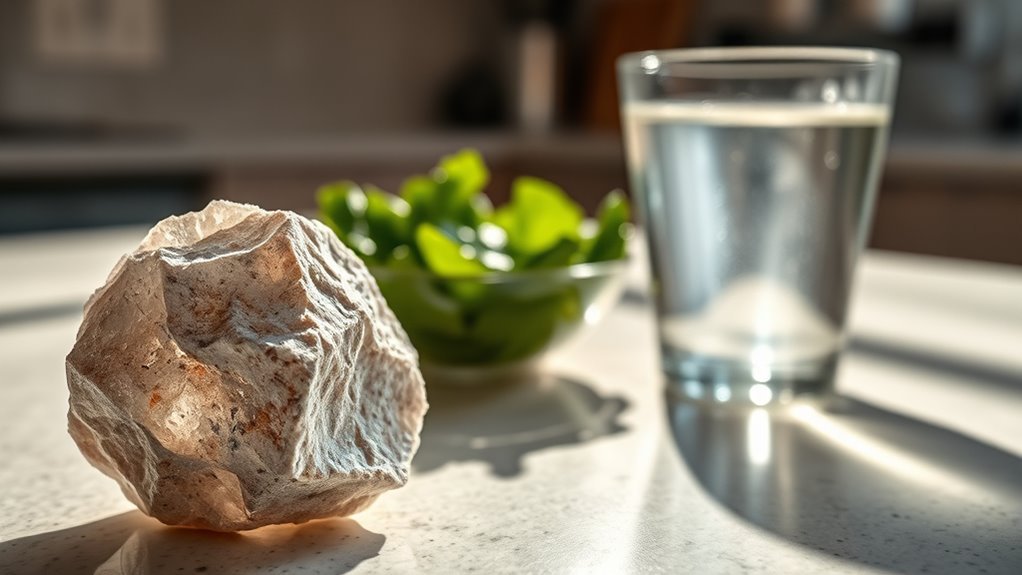The ketogenic diet can indeed increase the risk of kidney stones due to changes in mineral balance and dehydration from lower carb intake. The diet may elevate calcium and oxalate levels in your urine, leading to stone formation. Staying hydrated is essential, along with balancing your intake of oxalate-rich foods. While a keto diet has potential benefits, it’s vital to remain cautious. You’ll discover more about nutrient considerations and practical tips to minimize risks ahead.
Understanding Kidney Stones: Types and Causes

While kidney stones can be painful and alarming, understanding their types and causes can help you manage your health effectively. There are four primary kidney stone types: calcium oxalate, calcium phosphate, uric acid, and struvite stones. Each type forms due to different factors, often linked to dietary habits and hydration levels. For instance, calcium oxalate stones can develop when you consume too much oxalate-rich foods or not enough fluids. Uric acid stones may arise from high protein intake or dehydration. Recognizing kidney stone causes allows you to take preventive measures, such as adjusting your diet and increasing water intake. Empowering yourself with this knowledge can lead to better health outcomes and greater freedom from discomfort.
The Basics of the Ketogenic Diet

As you explore dietary options, understanding the basics of the ketogenic diet can be vital for making informed choices. The ketogenic principles focus on considerably reducing carbohydrate intake while increasing fats, which prompts your body to enter a state of ketosis. In this state, your body becomes more efficient at burning fat for energy. There are various diet variations within the ketogenic framework, such as standard, targeted, or cyclical keto, each catering to different lifestyle needs and goals. While many people experience weight loss and improved energy levels, it’s important to reflect on potential side effects, including the risk of kidney stones. Knowing these basics can empower you to decide if the ketogenic diet aligns with your health goals and preferences.
How Keto Affects Body Chemistry

When you follow a ketogenic diet, your body enters a state of ketosis, which can greatly impact your mineral balance and acid-base homeostasis. This shift may lead to increased calcium excretion, raising concerns about kidney stone formation. Understanding these changes is essential for managing your health while on keto.
Ketosis and Mineral Balance
Ketosis greatly alters your body’s chemistry, particularly in how it balances essential minerals. When you shift to a ketogenic diet, your mineral absorption can change markedly. This occurs partly because the reduced carbohydrate intake influences how your body processes and retains minerals like magnesium, potassium, and calcium. Maintaining electrolyte balance becomes vital, as the rapid loss of water weight can lead to imbalances, affecting everything from muscle function to hydration levels. Additionally, the lower insulin levels associated with ketosis can further impact how your body retains minerals. To mitigate these effects, consider incorporating mineral-rich foods or supplements to guarantee your body gets the essential nutrients it needs while enjoying the freedom of a keto lifestyle.
Acid-Base Homeostasis Impact
The shift to a ketogenic diet not only affects mineral absorption but also greatly influences your body’s acid-base homeostasis. When you drastically reduce carbohydrates, your body enters a state of ketosis, leading to increased production of ketone bodies. This can result in metabolic acidosis, where your blood becomes more acidic. While this may seem concerning, your body has mechanisms to maintain acid-base balance. However, prolonged acidosis can strain your kidneys as they work harder to filter out excess acids. It’s essential to monitor your body’s reactions during this change, ensuring you’re not unintentionally disrupting your acid-base balance. Staying hydrated and considering electrolyte supplementation can help mitigate these effects, promoting overall well-being while enjoying the freedom of a keto lifestyle.
Calcium Excretion Increase
As you adopt a ketogenic diet, you might notice an increase in calcium excretion, which can have significant implications for your body chemistry. This shift is primarily due to altered calcium metabolism, often triggered by changes in dietary sources. While keto emphasizes low-carb foods, it may lead to reduced intake of calcium-rich options like dairy and certain vegetables. Consequently, your body might excrete more calcium to maintain balance, potentially raising the risk of kidney stones if levels become excessively high. Monitoring your calcium intake through alternative dietary sources, such as nuts, seeds, and fortified products, can help mitigate this risk. Staying hydrated is also essential, as it aids in diluting calcium in the urine, reducing stone formation likelihood.
Research on Keto and Kidney Stone Formation
While many people turn to the ketogenic diet for weight loss and health benefits, research suggests a possible link between this high-fat, low-carbohydrate approach and kidney stone formation. Some studies indicate that the keto diet may lead to increased calcium and oxalate levels in urine, which could elevate the risk of stone formation. However, it’s important to note that the diet also promotes weight loss and improved metabolic health, contributing positively to kidney health for some individuals. Balancing keto benefits with potential risks is vital. Staying hydrated and monitoring your nutrient intake can help mitigate risks. Ultimately, a personalized approach is essential, so consider consulting a healthcare professional to navigate your dietary choices effectively.
Risk Factors for Kidney Stones on a Keto Diet
When following a keto diet, it’s vital to be aware of factors that may increase your risk of kidney stones. Dehydration and concentrated urine can lead to stone formation, especially if you’re not drinking enough water. Additionally, consuming high oxalate foods can further exacerbate this risk, making hydration and food choices essential for kidney health.
Dehydration and Urine Concentration
Dehydration poses a significant risk for kidney stones, particularly on a keto diet, which often leads to increased fluid loss. When you’re consuming fewer carbohydrates, your body may excrete more water and electrolytes, intensifying dehydration effects. This can result in concentrated urine, reducing urine dilution and increasing the likelihood of stone formation. It’s essential to stay well-hydrated while on a keto diet, as adequate fluid intake helps maintain the necessary urine volume to flush out minerals and prevent crystallization. Aim for at least 2 to 3 liters of water daily, adjusting based on your activity level. By prioritizing hydration, you can support your kidney health and enjoy the benefits of your diet without the added worry of kidney stones.
High Oxalate Foods
Certain foods, especially those high in oxalates, can increase the risk of kidney stones for individuals on a keto diet. High oxalate dietary sources include spinach, rhubarb, beets, nuts, and certain berries. While these foods are often considered healthy, they may contribute to stone formation when consumed in excess. On a keto diet, where you may focus on low-carb, high-fat options, it’s essential to be mindful of your oxalate intake. Balancing your diet with low-oxalate foods like cauliflower, cabbage, and zucchini can help minimize your risk. Staying hydrated is also vital, as it dilutes urine and reduces stone formation. By making informed choices, you can enjoy the flexibility of a keto lifestyle while protecting your kidney health.
Hydration and Its Role in Preventing Stones
Although many factors contribute to the formation of kidney stones, hydration plays an essential role in prevention. Staying well-hydrated helps dilute substances in your urine that can form stones. Effective hydration strategies include drinking water consistently throughout the day and monitoring your fluid intake to reach at least 2-3 liters daily. You might also consider incorporating electrolyte-rich fluids, especially if you’re on a keto diet, as this can help maintain proper hydration levels. Remember, dehydration can increase the risk of stone formation, so make it a habit to carry water with you. By prioritizing hydration, you can greatly reduce your chances of developing kidney stones while enjoying the freedom of your dietary choices.
Nutrient Considerations While on Keto
When you’re on a keto diet, it’s crucial to pay attention to your nutrient intake to guarantee you’re not just losing weight but also supporting your overall health. Proper nutrient timing and maintaining electrolyte balance can make a difference in your experience. Here’s a quick reference table to guide you:
| Nutrient | Importance |
|---|---|
| Sodium | Supports hydration |
| Potassium | Aids muscle function |
| Magnesium | Helps with energy levels |
| Calcium | Essential for bone health |
Expert Opinions on Keto and Kidney Stones
As many people embrace the keto diet for its potential weight loss benefits, concerns about kidney stones have emerged, particularly given the diet’s high fat and low carbohydrate nature. Experts suggest that while the keto diet can offer significant keto benefits, it may also require some dietary adjustments to mitigate risks.
- Increased fat intake can lead to higher oxalate levels, which may contribute to stone formation.
- Dehydration is a concern; adequate fluid intake is essential on a keto diet.
- Individuals with a history of kidney stones may need to approach keto with caution.
Ultimately, staying informed and consulting with healthcare professionals can help you navigate the balance between enjoying keto’s advantages while minimizing potential health risks.
Practical Tips for Reducing Kidney Stone Risk on Keto
To enjoy the benefits of the keto diet while minimizing the risk of kidney stones, you can adopt several practical strategies. Start by making dietary adjustments, such as increasing your fluid intake to stay hydrated, which helps dilute urine and reduces stone formation. Incorporate potassium-rich foods like avocados and leafy greens, as they can aid stone prevention. Limit your intake of high-oxalate foods, such as spinach and nuts, which may contribute to stone development. Additionally, balancing protein consumption is essential; too much can strain your kidneys. Regularly consult with a healthcare professional to tailor your diet and monitor your kidney health. With these steps, you can enjoy keto freedom while safeguarding against kidney stones.
Frequently Asked Questions about Keto and Kidney Stones
1. Can the ketogenic diet lead to kidney stones?
Yes, the ketogenic diet can potentially lead to an increased risk of kidney stones. This is primarily due to the diet’s high fat and low carbohydrate content, which can alter the body’s metabolism and urinary chemistry. When the body enters ketosis, it produces ketones that may raise the level of uric acid in the urine, a known contributor to certain types of kidney stones.
2. What types of kidney stones are associated with the ketogenic diet?
The ketogenic diet is primarily associated with the formation of calcium oxalate and uric acid stones. The increase in dietary fats and protein can lead to higher calcium levels in the urine, while the ketosis process may elevate uric acid levels, both of which can contribute to stone formation.
3. How can I reduce the risk of kidney stones while on a ketogenic diet?
To reduce the risk of kidney stones while following a ketogenic diet, consider the following strategies:
- Stay well-hydrated by drinking plenty of water throughout the day to help dilute urine.
- Limit foods high in oxalates, such as spinach, beets, and nuts.
- Monitor protein intake, as excessive protein may increase calcium and uric acid levels in urine.
- Consult with a healthcare professional or a registered dietitian to tailor your diet based on your individual health needs.
4. Are there any symptoms of kidney stones I should be aware of?
Common symptoms of kidney stones include severe pain in the back or side, pain during urination, blood in urine, frequent urination, and nausea or vomiting. If you experience any of these symptoms, it’s important to seek medical attention promptly for proper diagnosis and treatment.
5. Should I stop the ketogenic diet if I’m concerned about kidney stones?
Stopping the ketogenic diet is a personal decision and should be made based on individual health circumstances and concerns. If you have a history of kidney stones or are experiencing symptoms, it’s advisable to consult with a healthcare professional before making any changes to your diet. They can provide personalized recommendations and help you manage any risks associated with the ketogenic diet.
References
- https://www.ncbi.nlm.nih.gov/pmc/articles/PMC7364208/
- https://www.kidney.org/atoz/content/kidneystones
- https://www.health.harvard.edu/staying-healthy/the-ketogenic-diet-and-kidney-stones
- https://www.webmd.com/diet/what-is-the-ketogenic-diet
- https://www.ncbi.nlm.nih.gov/pmc/articles/PMC6520675/
- https://www.mayoclinic.org/healthy-lifestyle/nutrition-and-healthy-eating/expert-answers/keto-diet-and-kidney-stones/faq-20418635
- https://www.uclahealth.org/medical-services/nutrition/keto-diet-and-kidney-health
- https://www.clevelandclinic.org/health/diseases/15591-kidney-stones
- https://www.kidneyfund.org/kidney-health/kidney-stones/


